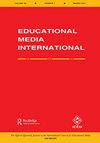Virtual Reality in education: supporting new learning experiences by developing self-confidence of Postgraduate Diploma in Education (PGDE) student-teachers
IF 1.4
Q2 EDUCATION & EDUCATIONAL RESEARCH
引用次数: 0
Abstract
Emerging evidence has demonstrated that Virtual Reality (VR) supported lessons are able to enhance positive emotions and engagement as well as more memorable experiences, when compared to more traditional instructional tools such as readings from textbooks and videos. However, teachers’ self-efficacy while teaching with VR technologies, VR safety in the classroom, the need for technical support and costs have been identified as potential obstacles for Pre-Service Teachers (PSTs) who are interested in the effective use of VR in the classroom. This study aims to explore how we may begin to address these obstacles by integrating VR supported lessons in Initial Teacher Education (ITE) courses. The originality of this study lies in the implementation of a short intervention in an already crowded Post graduate Diploma in Education (PGDE) curriculum and in analysing the impact on PSTs’ self-confidence as a factor to initiate sustainable development. Participants were 198 PGDE Primary School student-teachers, who attended two-hour VRsupported sessions a week apart in February 2020. Findings suggest that engagement with VR lessons have encouraged participanting PSTs to explore this technology for their future practice across different subjects, impacting positively on their self-confidence.教育中的虚拟现实:通过培养研究生教育文凭(PGDE)学生教师的自信心来支持新的学习体验
越来越多的证据表明,与传统的教学工具(如阅读教科书和视频)相比,虚拟现实(VR)支持的课程能够增强积极的情绪和参与度,以及更难忘的经历。然而,教师在使用VR技术进行教学时的自我效能感、VR在课堂中的安全性、对技术支持的需求和成本被认为是对在课堂中有效使用VR感兴趣的职前教师(pst)的潜在障碍。本研究旨在探讨我们如何通过将VR支持的课程整合到初级教师教育(ITE)课程中来解决这些障碍。本研究的独创性在于在已经拥挤的研究生教育文凭课程中实施短期干预,并分析对pst自信的影响,将其作为发起可持续发展的一个因素。参与者是198名PGDE小学的学生教师,他们在2020年2月每周参加两个小时的vr支持课程。研究结果表明,参与VR课程鼓励参与的pst在未来的不同学科实践中探索这项技术,对他们的自信心产生积极影响。
本文章由计算机程序翻译,如有差异,请以英文原文为准。
求助全文
约1分钟内获得全文
求助全文
来源期刊

Educational Media International
EDUCATION & EDUCATIONAL RESEARCH-
CiteScore
3.20
自引率
0.00%
发文量
10
 求助内容:
求助内容: 应助结果提醒方式:
应助结果提醒方式:


